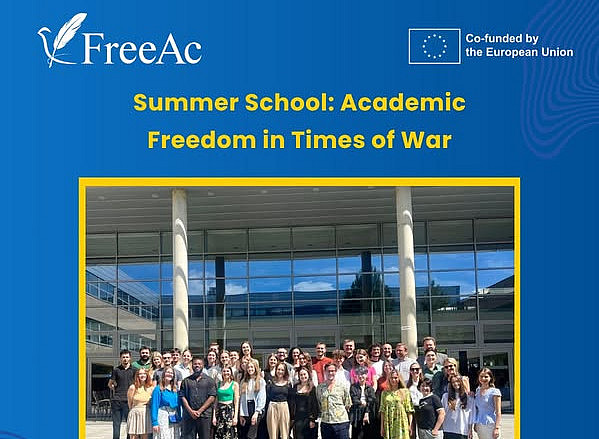The Summer School provided a unique space for academic dialogue on the threats to higher education in wartime and offered participants diverse perspectives, legal, political, ethical, and institutional, on the role of academia in upholding democratic values and fundamental rights.
The programme began with welcoming remarks and a presentation of the FreeAc project by Lisa Heschl (University of Graz). In his keynote lecture, Professor Zbyszko Melosik (AMU) critically examined the idea and reality of academic freedom as a social construct. Throughout the week, the school combined thought-provoking lectures with interactive sessions, including group work and collaborative research.
Highlights included:
International and legal perspectives on academic freedom, with contributions from Prof. Gerd Oberleitner (UNESCO Chair, University of Graz), Prof. Anna Potyrała and Prof. Jędrzej Skrzypczak (AMU),
A case study on scientific censorship and propaganda in Russian academia by Dr. Inna Makarenko (Sumy State University),
Presentations of key project outputs: baseline studies, manuals on integration of displaced scholars, and joint research efforts on the impact of war on Ukrainian academia,
A timely session on cybersecurity and AI threats for academic freedom in Ukraine led by Petro Katerynych (TSNUK),
And a two-part workshop on the Academic Freedom Index, conducted by Angelo Vito Panaro (Friedrich-Alexander-University Erlangen-Nürnberg), exploring global trends and assessment methodologies.
In light of the current legal restrictions on international travel for male students and academic staff from Ukraine, as well as other challenges posed by martial law, the core lectures of the Summer School were delivered online. This format was chosen to ensure the participation of Ukrainian students in the programme, enabling them to take part in academic discussions and benefit from international exchange despite the difficult circumstances.
As an integral part of the Summer School programme, two lectures by Ukrainian researchers („Potemkin Village of Russian Science: The Case of Editorial Boards“ by Inna Makarenko (Sumy State University) and „Resilient Minds, Fragile Networks: Protecting Academic Freedom and Rebuilding Ukraine’s Higher Education Amidst Cyberwars and AI Threats“ (2025 Cases) by Petro Katerynych (Taras Shevchenko National University of Kyiv) were featured within the framework of the guest lecture series “Ukrainian Voices: Academic Freedom in a Changing World”, organised under the FreeAc project. The Ukrainian Voices initiative aimed to support Ukrainian scholars by providing valuable access to the European academic landscape. It enabled researchers to share their work with broader academic and public audiences, ensuring that Ukrainian science remained actively represented within the European academic community.
The school strongly emphasised student engagement. Participants not only contributed their personal experiences and views on the importance of academic freedom but also worked in groups to analyse real-world challenges and propose practical solutions. Their findings were presented on the final day, followed by a reflective wrap-up by Dr. Bartosz Hordecki (AMU) and Dr. Lisa Heschl (University of Graz).
The Summer School reaffirmed the need to protect and promote academic freedom as a cornerstone of resilient and democratic societies. As the war in Ukraine continues, initiatives like FreeAc remain vital for ensuring that academic voices are not silenced but heard, supported, and empowered across borders.
Stay tuned for more updates and future activities of the FreeAc project!
Learn more about the FreeAc project: https://www.freeac.eu/about-project/
